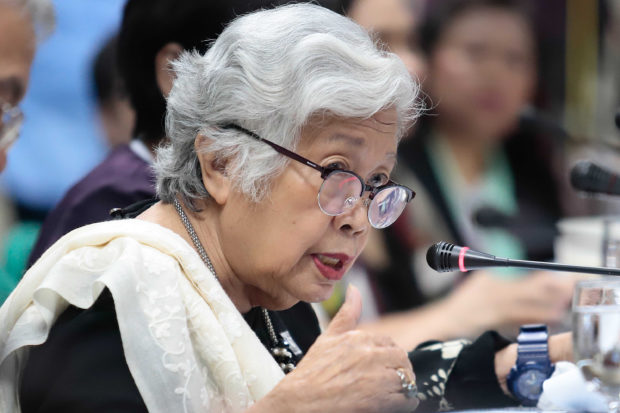What epidemic of illiteracy? DepEd chief hits reports that 70K Bicol students can’t read

Education Secretary Leonor Briones attends the Committee on Basic Education, Arts and Culture, public hearing on Programme for International Student Assessment (PISA) test held at the Philippine Senate in Pasay City on Thursday, February 13, 2020. (Henzberg Austria/Senate PRIB)
MANILA, Philippines — Department of Education (DepEd) Secretary Leonor Briones on Monday clarified media reports saying that more than 70,000 elementary students in Bicol “cannot read” in both English and Filipino, calling it “exaggerated” and inaccurate.
The reports, citing data from the Philippine Informal Reading Inventory (PHIL-IRI), claimed that more than 70,000 students from Grade 1 to senior high school in Bicol “cannot read”.
PHIL-IRI is an informal reading inventory consisting of graded passages designed to determine a student’s performance in oral reading, silent reading, and listening comprehension.
But Briones, in a press briefing in Malacañang, said the reports are “exaggerated” as they could have combined the number of students having difficulty reading English and Filipino. She also emphasized that not knowing or having difficulty in reading is “different from being illiterate.”
“Palagay ko insulto naman ‘yun sa mga Bicolano,” Briones said. (I think that’s an insult to Bicolanos.)
Article continues after this advertisementAccording to the education chief, PHIL-IRI is an annual diagnostic tool used by DepEd to ascertain the student’s level of comprehension and to determine if their level of understanding is appropriate for their school level.
Article continues after this advertisement“Hindi ibigsabihin illiterate sila,” Briones stressed. (That doesn’t mean they are illiterate.)
“At saka iyong paggamit ng … iyong precision in the use of the words ‘do not know how to read,’ hindi ibig sabihing ‘no read, no write’. Kasi may mga kategorya iyan eh – Nakakabasa pero hindi lubos na nakakaintindi. So iba’t-ibang level iyan.”
(And also…the precision in the use of the words ‘do not know how to read’, that doesn’t mean ‘no read, no write’. Because there are different levels of understanding. They can read but they cannot fully comprehend. There are different levels.)
She also asked members of the media to be careful in reporting about the issue.
The report came after the Philippines performed the poorest out of 79 countries in the 2018 Program for International Student Assessment (PISA) exam, which is a reading literacy assessment conducted by the inter-government group Organization for Economic Co-operation and Development.














